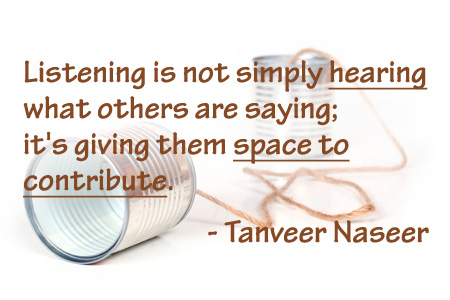In my work with various leaders, one of the strategies I often share is employing the art of asking questions. While asking questions can help a leader gain a better understanding of current conditions both within and outside their organization, it can also prove to be a helpful tool in gaining insight from one’s own experiences.
It’s an idea I was recently reminded of during an interview I did with my friend and fellow leadership expert Kevin Kruse for his leadership podcast, The LEADx Leadership Show. During the interview, Kevin asked me to share with his audience a story of when I failed as a leader and what I learned from that experience.
Now while the focus of Kevin’s question was to showcase how as leaders we can learn from past mistakes, I realized that there’s also within this story a powerful lesson on what it really means to be a good listener, especially when you have the responsibility to lead others.
In one of my first management roles, I had the responsibility of overseeing the functioning of several laboratories in a biotech firm, along with managing the cleaning staff. As the cleaning staff didn’t come from a science background as I did, I wanted to help them understand the work that was being done and how their efforts helped with these ongoing projects.
One day, one of the senior directors – who at the time was also one of my mentors – called me into his office for a quick chat. After exchanging a few updates, the director told me that he had received a few complaints from some members of the cleaning staff (before I joined the company, the cleaning staff had worked under this director).
I figured this probably had to do with some new demand being put upon my team by one of the project leaders. So I already started plotting in my mind where I could find time to sit down with the cleaning staff to explain these new requests.
As it turned out, the complaint wasn’t about some new demand. Instead, the complaint was about me. Specifically, the cleaning staff had become disgruntled over how I was speaking with them.
The director went on to explain how the cleaning staff initially enjoyed working under me, but lately, I left them feeling as though their only job was to do my bidding.
As hard as it was to hear, I began to realize that in my drive to inform my employees, I had unintentionally turned our conversations into one-way interactions. Put simply, I had become the dreaded micromanager interested more in telling people what to do than in listening to what they had to say.
While my story illustrates the ease with which any of us can become disempowering micromanagers, I realized it also revealed the importance of why leaders need to be good listeners if we are to ultimately succeed in our efforts.
Namely, that to effectively lead others, we need more than our perspective. We need insights from those we lead [![]() Share on Twitter].
Share on Twitter].
In that conversation with this director, I realized that while my actions were driven by good intentions, the problem I had was that I ended up being too focused on what I wanted to tell my team. And that inward focus on my message left my team feeling as though I didn’t care about hearing about their insights on what could be done.
Thanks to this failure in how I led this team I learned that listening is not simply hearing what others are saying; it’s giving them space to contribute [![]() Share on Twitter]. In some cases, that might be a unique perspective on a particular issue, a new insight on how to approach a problem, or just the opportunity to give voice to what they’re feeling about what they see going on around them.
Share on Twitter]. In some cases, that might be a unique perspective on a particular issue, a new insight on how to approach a problem, or just the opportunity to give voice to what they’re feeling about what they see going on around them.
In other words, effective listening is about ensuring people feel understood because what they share matters [![]() Share on Twitter].
Share on Twitter].
Of course, if we look at renowned leaders like Sir Richard Branson or Nelson Mandela, we can find another critical ingredient necessary to becoming a better listener and with it, the kind of leader our employees need us to be.
Specifically, to be a good listener, leaders need to be curious about others and not simply focused on themselves [![]() Share on Twitter].
Share on Twitter].
Indeed, one trait all successful leaders openly exhibit is being inquisitive; that their focus is not limited to their ideas, their stories, and their experiences. Rather, they display a genuine interest to learn about those they lead and work with; to hear their stories and experiences that have shaped and informed their understandings and perspective.
That’s why being a good listener involves shifting our focus from trying to be interesting to being interested [![]() Share on Twitter].
Share on Twitter].
Although it’s been well over a decade, I still remember that conversation and not just because it represents one of the more painful moments where I failed as a leader.
Rather, the memory of that failure still resonates because of the powerful lesson it taught me – that the key to effective leadership lies in our willingness to become better listeners, something that will help us to understand the realities our employees face, as well as what they need from us to succeed and thrive under our care.

